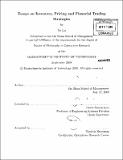Essays on inventory, pricing and financial trading strategies
Author(s)
Lu, Ye, Ph. D. Massachusetts Institute of Technology
DownloadFull printable version (4.314Mb)
Other Contributors
Massachusetts Institute of Technology. Operations Research Center.
Advisor
David Simchi-Levi.
Terms of use
Metadata
Show full item recordAbstract
In a multi-product market, if one product stocks out, consumers may substitute to competing products. In this thesis, we use an axiomatic approach to characterize a price-dependent demand substitution rule, and provide a sufficient and necessary condition for demand models where our demand substitution rule applies. Our results can serve as a link between the pricing and inventory literature, and enable the study of joint pricing and inventory coordination and competition. I demonstrate the impact of this axiomatic approach on the joint pricing and inventory coordination model by incorporating the price-dependent demand substitution rule, and illustrate that if the axiomatic approach is acceptable, the optimal strategy and corresponding expected profit are quite different than models that ignore stockout demand substitution. I use this price-dependent demand substitution rule to model the joint pricing and inventory game, and study the existence of Nash equilibrium in this game. In the second part of this thesis, I consider the problem of dynamically trading a security over a finite time horizon. The model assumes that a trader has a "safe price" for the security, which is the highest price that the trader is willing to pay for this security in each time period. A trader's order has both temporary (short term) and permanent (long term) impact on the security price and the security price may increase after the trader's order, to a point where it is above the safe price. Given a safe price constraint for the current time period, I characterize the optimal policy for the trader to maximize the total number of securities he can buy over a fixed time horizon. (cont.) In particular, I consider a greedy policy, which involves at each stage buying a quantity that drives the temporary price to the security safety price. I show that the greedy policy is not always optimal and provide conditions under which the greedy policy is optimal. I also provide bounds on the performance of the greedy policy relative to the performance of the optimal policy.
Description
Thesis (Ph. D.)--Massachusetts Institute of Technology, Sloan School of Management, Operations Research Center, 2009. Cataloged from PDF version of thesis. Includes bibliographical references (p. 83-85).
Date issued
2009Department
Massachusetts Institute of Technology. Operations Research Center; Sloan School of ManagementPublisher
Massachusetts Institute of Technology
Keywords
Operations Research Center.